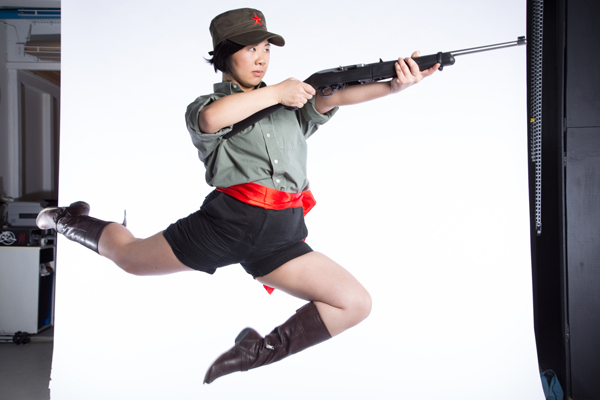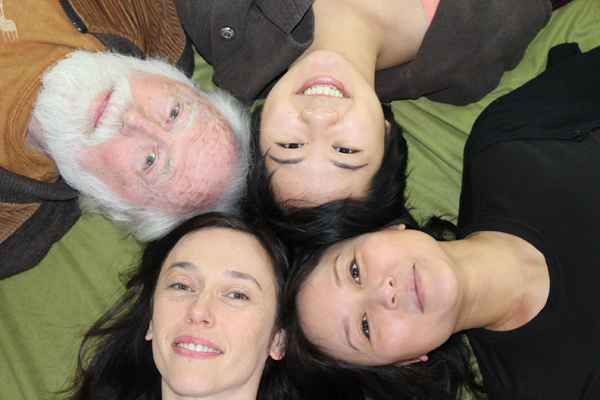|
Photo Credit: Ryan Fisher Janet Lo plays Jiang Qing in the play ‘Madam Mao’.

Photo Credit: Ryan Fisher Samantha Wan plays a charactor in the play ‘Madam Mao’.

Photo credit: John Rowe Clockwise from lower right: Janet Lo, the producer, co-creator and perfomer, Severn Thompson, the director, Paul Thompson, the co-creator and Samantha Wan, a perfomer of the play ‘Madam Mao’
“There is no doubt that Madam Mao was evil. But no one is born that way. What we hope to do with the play is explore how and why Jiang Qing has become so hated and feared.” Says Lo.
The full text of the written Q and A interview:
Loving Sister: What inspired you and Paul Thompson, the co-creator, to create a play on Jiang Qing?
Janet Lo: Three years ago I read a book about Jiang Qing called White Boned Demon. Up until this point I knew very little about her. I was immediately struck with how wonderfully delicious and controversial she was. Generally speaking, the Chinese do not want to present their (our) women in a "bad" light. Of course, this attracted me immediately and I had a burning desire to play her.
In the 1970's, Paul Thompson was approached by producers to create a play about Jiang Qing using his techniques of Collective Creation which combines improvisation and research. It was an idea before it's time.
On an occasion of sheer coincidence, I had a conversation with Paul in the summer of 2011 about wanting someone to write a play for me about Jiang Qing. Paul immediately offered to create this play with me.
Loving Sister: How did you and Thompson do research on Jiang Qing’s life? What were the challenges? How did you overcome them?
Janet Lo: Research-wise, we began to read any and everything about Jiang Qing, Mao, the Cultural Revolution, her 8 model plays, etc., etc. As you can see, one of the major challenges is that hers is a very BIG story. How do we boil it all down to something that can be presented as a piece of theatre? Also, through our workshops, it became very clear that our audience knew very little about Chinese history, even though this all happened quite recently, The Cultural Revolution was from 1966 - 76. When developing a play with a historical and biographical nature, the largest challenge is to provide a context for the audience without overloading them with information or killing the theatricality of the piece. One solution we’ve used is to set the play at a time late in her life, imprisoned for years and living largely within her memories. Moments from her past will present themselves unpredictably as Jiang Qing’s mind wanders or is triggered by an incident. The character of the visitor will bring a certain amount of background information to the piece as she attempts to get answers from Jiang Qing about her involvement in the atrocities of the Cultural Revolution. We also decided that we would focus on the parts of her life that included Culture, since she was the so-called expert on the Arts during this time.
Another challenge was getting first hand interviews since most of our family members who were directly affected by Jiang Qing did not want to talk about it. I was able to interview a man who was a member of the No.1 Peking Opera troupe and performed in one of her 8 model plays. We also watched interview of Anchee Min, a Chinese American novelist starred in a movie Jiang Qing produced during the very end of Mao's life. We also spoke for an afternoon with a man who is a self-professed member of the Communist Party of Canada.
Loving Sister: Were you and Thompson trying to present a play based on an authentic character or a character interpreted by you and Thompson? In the writing process, were your and Thompson's interpretations different? How did you work out the differences if there were?
Janet Lo: I think I need to talk about how we are creating this play. It is a process called the Collective Creation, in which we improvise all the scenes, therefore there is no writing process; pen is not put to paper (or fingers to the keyboard). Difference in interpretations, like any rule of improvisation, is handled by saying YES, AND. For instance, if she feels that Jiang Qing needs to show more vulnerability, we would add a scene or moment where that can happen. Nothing is ever negated, we just add onto it.
Loving Sister: For the Collective Creation, it involves a lot of improvisation. I wonder if the improvisation stops at certain point and the lines become "fixed". If that is the case, will the casting members write down some notes or a final version of the script so the show can be presented within a fixed time frame like 60 minutes for your play?
Janet Lo: Exactly, in fact we are at the phase where we are "fixing" the lines (Note: This part of the interview took place on July 27). We have many hours of dialogue to draw from. We would do a scene many different ways. Just this weekend, we had to decide on a final draft. We would chose elements of what we liked from the different versions and put them together; adding a line from here or there; changing the order of bits of conversation etc.. It feels a bit like shuffling a deck of cards. And now that we have a working draft, much of this week will be working with Heidi Chan, our composer and live musician. She will now continue to improvise musically to highlight or underscore the text, invoking emotion or tension or what have you.
Janet Lo: The topic of Jiang Qing, especially to Chinese people in their 40's or older, have a very negative reaction. We want to be respectful to their experience and not be offensive. On the other hand, we also want to present Jiang Qing as a fully realized person, with hopes, idealisms and dreams. There are two sides to every story and we want to present both sides. We hope to achieve through the character of an official who is tasked with getting a confession from Jiang Qing, who has been in prison for 15 years. Jiang Qing is willing to defend herself by telling her story in hopes of being released.
Loving Sister: How do you portray Jing Qing in the play? What were the major challenges? How did you overcome them?
Janet Lo: The major challenge for me is wearing so many hats. I am the producer which involves raising (groveling for) money, allocating it, gathering people to work on it, scheduling, marketing, publicity, as well as creating and acting! The challenge in playing Jiang Qing is to make her 3 dimensional. A real person. Then there is also playing the span of her life, from a young idealistic woman to an elderly political prisoner at the end of her life. It is, in large, a memory play. So there is some leeway, her memories can be how she perceived an event has happened, or how she romanticized it happened.
Loving Sister: Any Chinese languages are spoken in the play?
Janet Lo: Very little Manderin is spoken, perhaps a phrase here and there.
Loving Sister: What do you and Thompson hope that the audience will take away from the play?
Janet Lo: There is no doubt that Madam Mao was evil. But no one is born that way. What we hope to do with the play is explore how and why Jiang Qing has become so hated and feared. If you were in her shoes, a woman born into poverty and then came into power, living in a time off continual turmoil that was Communist China during Mao's reign, would you do everything you could to maintain that power?
Also, we hope to whet the audience's appetite for Chinese history and inspire them to learn more.
Loving Sister: Anything else would you like to share with our readers regarding the play?
Janet Lo: In the very beginning, we started developing the piece as a one person show. But unlike Jiang Qing, I do not want to be alone onstage. We then added a second actor (Samantha Wan), then a choreographer (Jeffrey Chan) and a live musician/composer (Heidi Chan). Severn Thompson, Paul's daughter, recently took over directing the show and having more Chinese artists and women artists have really enhanced the show.
Samantha Wan, being quite young, adds a generational element. She is also a dancer and martial artist and she uses these skills in the play. Jeffrey Chan is helping us with the Revolutionary movements that were developed for her 8 Model Plays. Heidi Chan is underscoring us with live music. It is the nature of Collective Creations that people come together organically. I am so fortunate to be presented with these individuals at a time when their energies and talents were needed.
(All rights reserved) |


